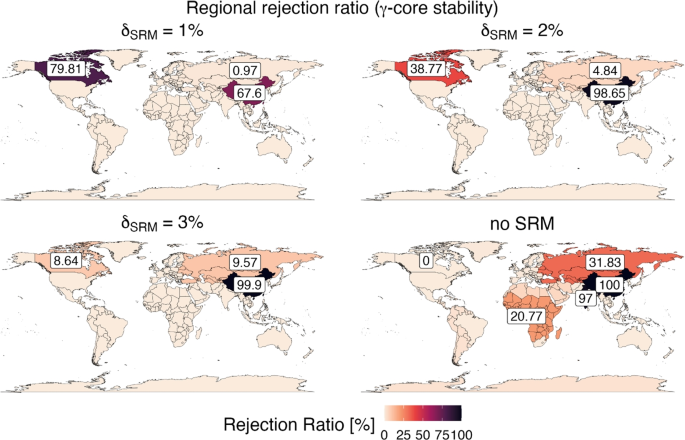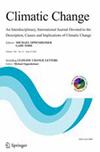SRM摆在桌面上:地球工程对气候联盟稳定性和有效性的作用
IF 4.8
2区 环境科学与生态学
Q1 ENVIRONMENTAL SCIENCES
引用次数: 0
摘要
由于极端气候的增加和全球碳排放减缓进展缓慢,包括太阳辐射管理(SRM)在内的地球工程受到越来越多的关注。这一气候政策选择,即使作为一种可能性,也可能对国际气候治理产生重大影响。在这里,我们通过数值模拟研究了太阳能工程如何影响大量区域联盟的有效性和稳定性。我们在全球政治或经济力量方面假设了一个要求,并分析了当联盟共同决定地球工程和缓解时的排他性成员联盟形成过程。我们表明,地球工程可以为合作提供激励,并部分解决气候联盟稳定性和有效性之间的典型权衡。然而,降低温度主要是通过在联盟内部部署SRM,而不是通过进一步减排,从而使世界面临相对大规模的SRM部署,其潜在的副作用和风险目前尚不确定。本文章由计算机程序翻译,如有差异,请以英文原文为准。

SRM on the table: the role of geoengineering for the stability and effectiveness of climate coalitions
Abstract Geoengineering, including solar radiation management (SRM), has received increasing scrutiny due to the rise of climate extremes and slow progress in mitigating global carbon emissions. This climate policy option, even as a possibility, can have consequential implications for international climate governance. Here, we study how solar engineering affects the effectiveness and stability of a large set of regional coalitions through numerical simulations. We posit a requirement in terms of global political or economic power and analyze the exclusive membership coalition formation process when coalitions jointly decide on geoengineering and mitigation. We show that geoengineering can provide incentives for cooperation and partially solve the typical trade-off between stability and effectiveness of climate coalitions. However, temperature reduction mostly comes from deploying SRM within the coalition rather than from further emission reductions, thus exposing the world to relatively large-scale deployment of SRM with as of today uncertain potential side effects and risks.
求助全文
通过发布文献求助,成功后即可免费获取论文全文。
去求助
来源期刊

Climatic Change
环境科学-环境科学
CiteScore
10.20
自引率
4.20%
发文量
180
审稿时长
7.5 months
期刊介绍:
Climatic Change is dedicated to the totality of the problem of climatic variability and change - its descriptions, causes, implications and interactions among these. The purpose of the journal is to provide a means of exchange among those working in different disciplines on problems related to climatic variations. This means that authors have an opportunity to communicate the essence of their studies to people in other climate-related disciplines and to interested non-disciplinarians, as well as to report on research in which the originality is in the combinations of (not necessarily original) work from several disciplines. The journal also includes vigorous editorial and book review sections.
 求助内容:
求助内容: 应助结果提醒方式:
应助结果提醒方式:


